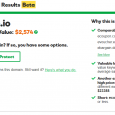Top 10 Link Building Notions that Confound Even the Pros
Link building is essential to SEO and gaining organic traffic. It is the gold standard and universal currency that has always been used by search engines to assign ranks on the SERPs to web pages. The definition of link building you can find on Wiki here
With quality backlinks, especially for the competitive keywords, you can drive targeted traffic to your website without having to spend on ads.
Table of Contents
- 1. Links from directories are worthless
- 2. Getting too many links at once is bad for your site
- 3. Too many outbound links are bad for the site’s SEO
- 4. Soliciting links may invite penalties
- 5. Links from sites with lower authority than your site are no good
- 6. Only one link per domain is acceptable to the search engines
- 7. Link building can be pursued in isolation of other traffic generation strategies
- 8. Reciprocal links will get you penalized
- 9. Links are permanent
- 10. No-follow links are worthless

image source: Shutterstock
However, link building works only when done right. A wrong approach can and indeed has packed off many websites to oblivion. This article focuses on notions associated with link building. These are persistent misconceptions, not borne out by experience, and yet they have held back businesses from benefiting from link building like how they should.
1. Links from directories are worthless
Once upon a time, blog and website directories were an easy way to get valuable backlinks. But all good things come to an end, and this age of simple and easy SEO too passed. One reason for this was that webmasters spammed directories and diluted the very purpose of which these directories were created. Poor quality sites added to directories led to Google penalizing sites with directory backlinks. Once the Penguin updates happened, and people realized that Google was serious about cleaning the SERPs off low-quality sites, they quickly moved away from directories.
However, links from good directories are still useful. Directories dedicated to specific niches and with a focus on quality are good sources of backlinks. If you run a local business, then a listing in a good directory will definitely count.
2. Getting too many links at once is bad for your site
This is perhaps the most persistent myth that even experienced SEOs believe. Now, to be fair, there is likely some truth in the fact that going too fast with link building can serve as a red flag to the search engines. This suggests that the links are not organic. Sites overly optimized for search terms and using keywords as the anchor are frowned upon. And often, it is such sites that catch the attention of search engines with a rush of backlinks in a manner of days.
But, getting a slew of backlinks from a piece of viral content or breaking news is natural and there’s nothing that you can do about it, except welcome it because this is what you want and it’s not something that happens every day. Google can make out the difference between quality links originating from viral pieces and truly informational content and low-quality backlinks from link farms. Considering these points, you should be fine with a clutch of backlinks that may appear in a short period.
3. Too many outbound links are bad for the site’s SEO
It used to be true in the past, but no longer. Earlier, Google has explicitly stated that links on a page should not exceed a reasonable number, and should be less than 100. But this was more in context of user experience than any metric that back then Google was using for SEO. So long as the links serve a purpose and are to quality sites, you can have a good number of links on your page. Ensure that the links are not low quality or weak. If Google suspects spam or manipulation, then the site may invite action.
4. Soliciting links may invite penalties
There is nothing to fear, so long as you are engaging in wholesale link purchases and patronizing link selling sites. Google frowns upon this because it leads to the mushrooming of low-quality sites set up expressly for the purpose of selling links. You are; however, perfectly within your rights to reach out to sites to solicit links if you feel that the content on your site will be appreciated by the visitors to the linking site. Accepting such a proposal is totally at the discretion of the recipient of your offer. It is free of inducements and is fair.
This belies common sense. Why would links from sites with lower authority than yours not have any value? Assess the relevance and quality of content of the site linking to you. In time, the site may acquire authority and rank that outstrips your site. Then, link juice from that backlink will be worth its proverbial weight in gold. Accumulating links from good sites even with low authority is a great idea.
6. Only one link per domain is acceptable to the search engines
This one is another persistent myth and has arisen because of people trying to game SEO by sending multiple backlinks from the same domain. Of course, a site with a backlink profile that includes multiple domains will always be desirable but there is absolutely no reason why you cannot have two or three links from a single domain. Usefulness and relevance are metrics to consider.
7. Link building can be pursued in isolation of other traffic generation strategies
This could have worked in the past, but not in these days of social media and an audience that is online on mobile devices. Content marketing is today an integral part of SEO. It can get you backlinks. Articles that succeed on social media or through guest posts are great hooks to acquire valuable links. Focus on great content that adds value, do the necessary content marketing and outreach, repeat. You will reap benefits in the form of targeted traffic and good one-way links.
8. Reciprocal links will get you penalized
When search algorithms were not as evolved as they are today, avoiding reciprocal links was a safer thing to do. Today, Google can detect a pattern and associated intent. So, if you intend to benefit from reciprocal links by participating in link-building schemes, then do not. But an unintentional or even intentional reciprocal link will not lead to penalties.
9. Links are permanent
No, they are not. Links are around only as long as the linking website is up. If the site folds, then the links go. Or, the webmaster may simply edit the article carrying the link and the link will cease to exist. This is the reason why SEO needs regular attention. It’s not a one-time thing. Links come and go, you need to consistently work on acquiring quality links.
10. No-follow links are worthless
No-follow links serve a very useful purpose. They indicate to search engines that you have acquired the links naturally and in an organic manner. In fact, it is a good idea to focus only on creating great content and acquiring links without bothering whether these are do-follow or no-follow.





Very cool article !!! thank you
Thanks! You’re welcome!